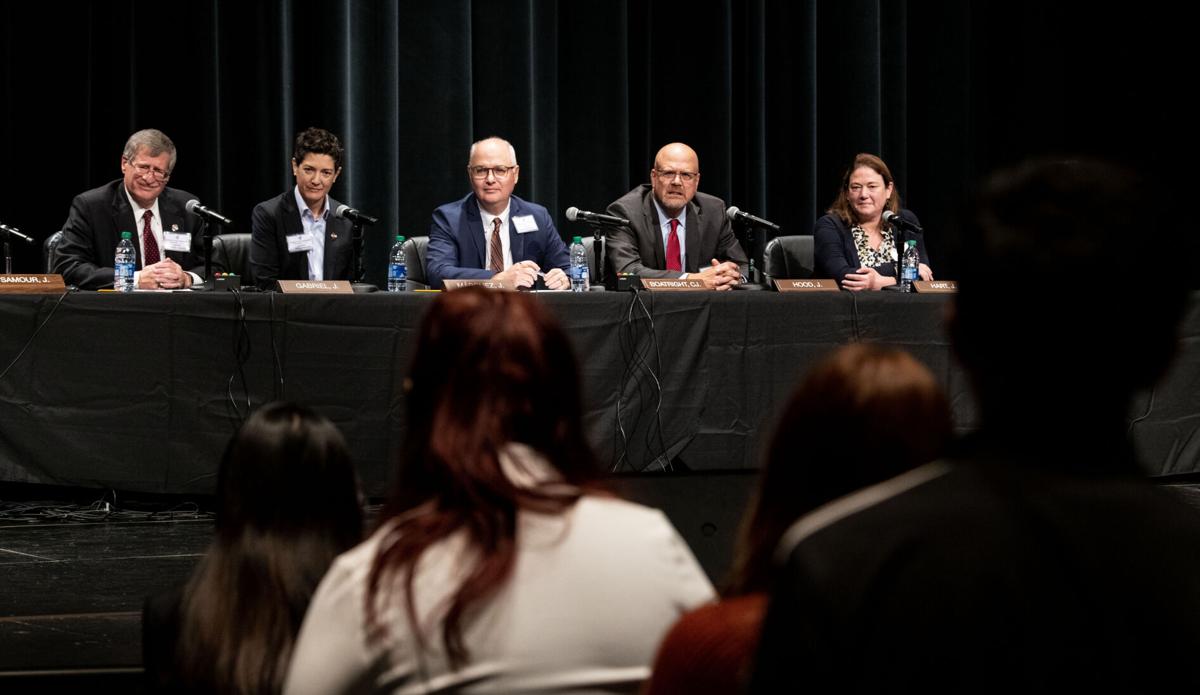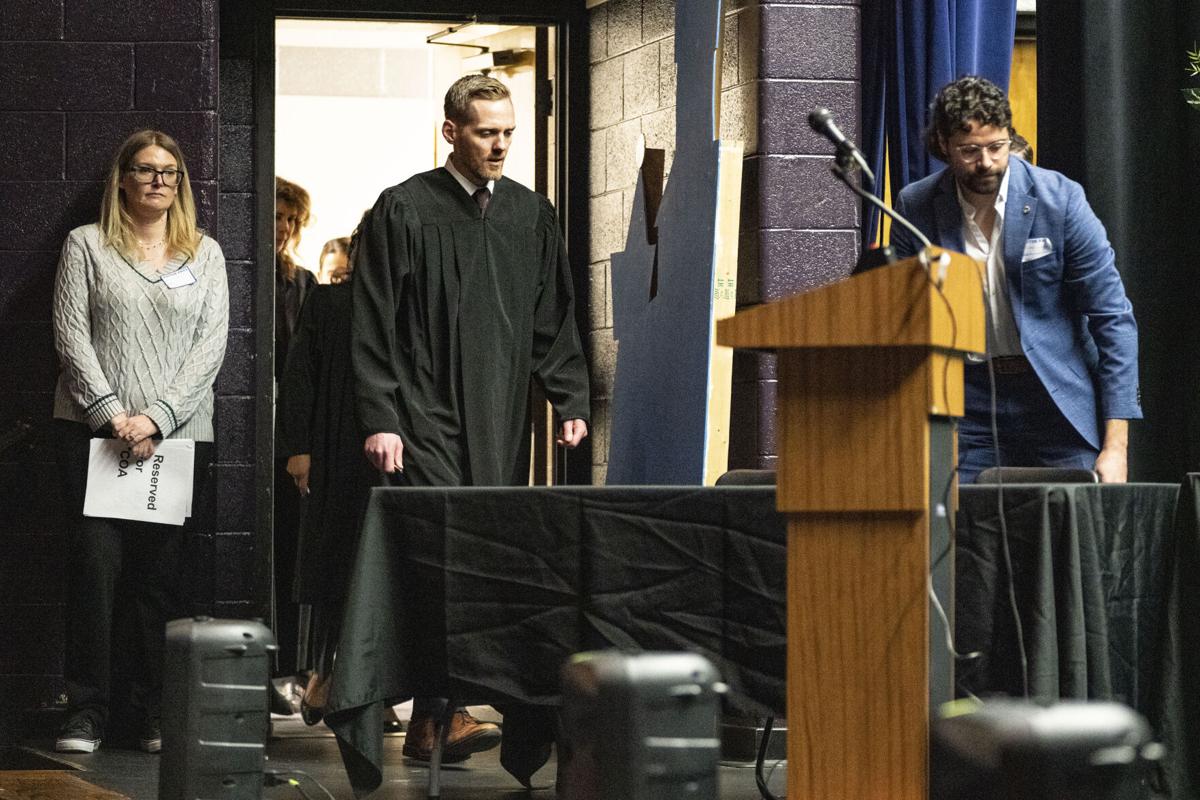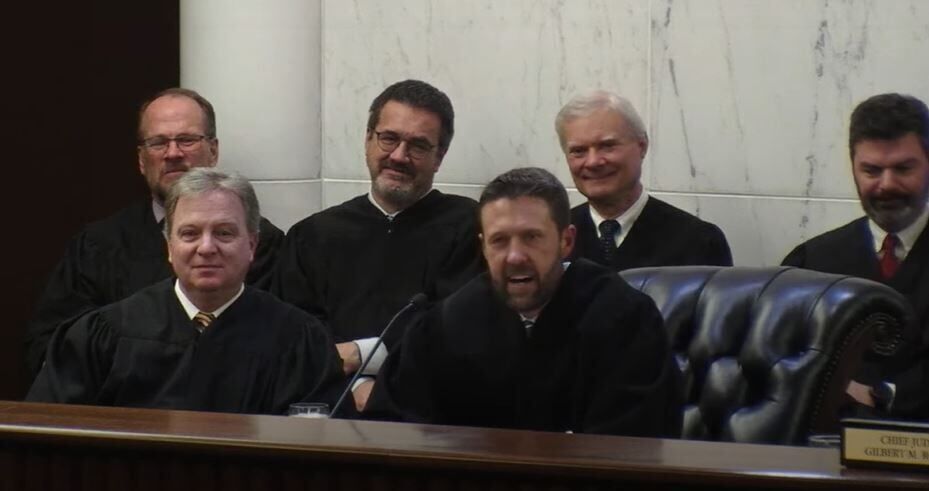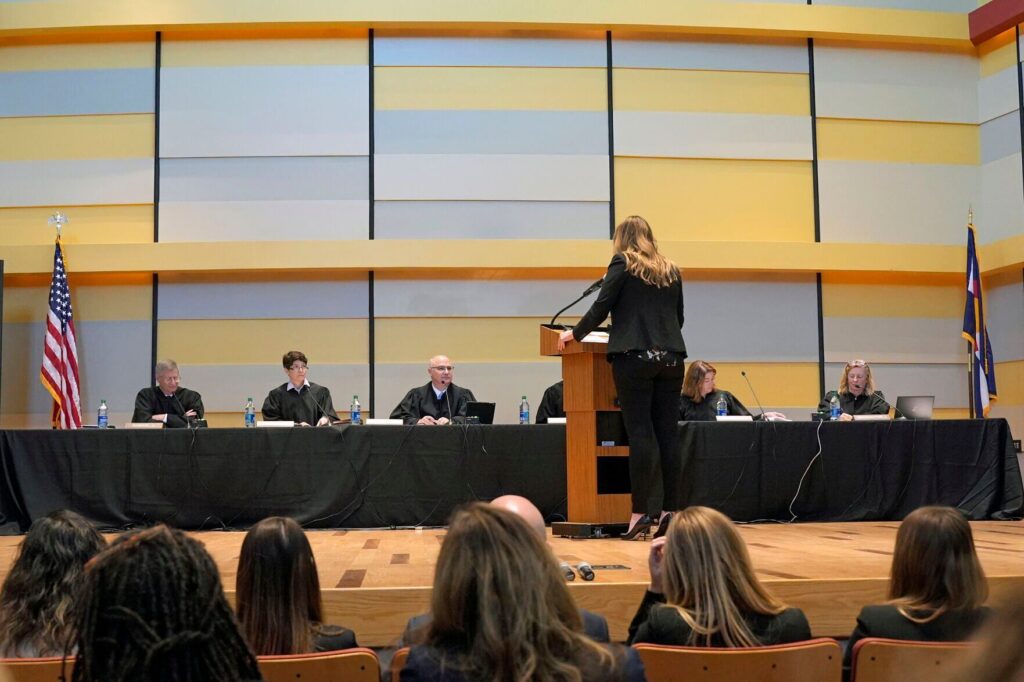Colorado Supreme Court accepts cases on parole revocation, debt collection

FILE PHOTO: Students from Pine Creek High School ask the justices of the Colorado Supreme Court questions after watching them hear arguments from two cases in the high school auditorium on Nov, 17, 2022. Pictured from left to right are Justice Richard L. Gabriel, Justice Monica M. Márquez, Chief Justice Brian D. Boatright, Justice William W. Hood III and Justice Melissa Hart.
Parker Seibold/The Gazette
The Colorado Supreme Court recently announced it will decide whether people must appeal their revocation of parole to the parole board itself, or if they can seek judicial review directly.
At least three of the seven members must agree to hear a case on appeal.
The justices also will decide whether a debt collection company complied with the law when pursuing a woman’s $671 credit card debt. Further, they ordered a response to the claim that a judge wrongly ordered the Boulder County District Attorney’s Office to pay for the costs the defense incurred when responding to a prosecution oversight.
Finally, the Supreme Court signaled it may intervene in a case out of El Paso County involving a juvenile defendant. The court has prohibited the public from accessing the filings. Consequently, there is no further information about the circumstances of the case.
Parole board appeals
Last fall, a three-judge Court of Appeals panel ruled for the first time that judges may hear challenges to parole revocations without the defendant needing to go through a parole board appeal.
The majority noted the process for returning someone to incarceration for violating the conditions of their parole first entails a hearing by one parole board member. After that portion concludes, the defendant “may appeal” the decision to two other members of the parole board.
However, wrote Judge Matthew D. Grove for himself and Judge Terry Fox, state law does not say that is the only path a defendant can take, as parolees may also seek relief from the courts for alleged “unlawful revocation of parole.”
Judge Grant T. Sullivan dissented, worrying the ability of defendants to “leapfrog” a parole board appeal would result in negative consequences.
“For example, allowing parolees to bypass the appellate body’s review will deprive the Board of its ability to correct errors committed by the single Board member who presided over the initial revocation hearing, potentially leading to even more protracted litigation that could have been avoided,” he wrote.

Colorado Court of Appeals Judge Grant T. Sullivan walks into the auditorium for oral arguments at Fort Lupton High School on Tuesday, April 2, 2024 in Fort Lupton, Colorado. The Colorado Court of Appeals and Supreme Court hold "Courts in the Community" events for students to learn about the justice system and hear real cases. (Rebecca Slezak For The Denver Gazette)
Rebecca Slezak
Sullivan added that the requirement in other contexts for a person to go through an executive agency’s internal grievance process before filing suit is intended to promote efficiency, allow subject matter experts to weigh in first and conserve judicial resources.
The Supreme Court has agreed to review the decision. Justice Maria E. Berkenkotter is not participating, as she handled the early stages of defendant Shams Abdul-Rahman’s case in her prior role as a Boulder County trial judge.
The case is People v. Abdul-Rahman.
Debt collection
Portfolio Recovery Associates, LLC filed a complaint to collect on a $671 debt from the credit card account of Felicia Wright. It alleged Wright failed to pay the amount to Comenity Bank, who later sold the account to the debt collector. Wright, in turn, filed claims alleging PRA violated the Colorado Fair Debt Collection Practices Act.
After a trial, Boulder County Court Judge Jonathon P. Martin found PRA was the owner of Wright’s debt, despite “ambiguities, even inconsistencies in the attached documents.” He also declined to find PRA in violation of Colorado’s debt collection law.
Last August, District Court Judge J. Keith Collins upheld that ruling on appeal. He agreed PRA’s documentation of the debt “contained some ambiguity” but that Martin had “considered the inconsistencies in the documents and the reliability of the documents when making its findings that the inconsistencies (do) not undermine the authenticity.”

The Ralph L. Carr Colorado Judicial Center, on Tuesday, Sept. 13, 2022, in Denver, Colo. (Timothy Hurst/The Denver Gazette)
Timothy Hurst
Wright then appealed to the Supreme Court, asking it to review the conclusion that PRA had complied with the law and was allowed to collect on the debt.
“The question of what materials must be attached to debt buyers’ collection complaints in Colorado is a matter of first impression for this Court,” wrote Wright’s attorneys.
The Supreme Court will decide whether PRA complied with the debt collection law and whether Wright proved her own claims.
The case is Wright v. Portfolio Recovery Associates, LLC.
$3,000 to delete a photo?
When Boulder County prosecutors charged a defendant with sexual assault on a child, the Longmont Police Department uploaded evidence to a digital folder. The police shared the folder with the district attorney’s office, who then gave access to the defense lawyer.
At one point, the prosecutor realized one photo depicting child sex abuse material was not meant to be disclosed. The prosecutor obtained a court order for the defense to destroy the explicit image.
However, according to the district attorney’s petition to the Supreme Court, the defense attorney — working through the Office of the Alternate Defense Counsel, which steps in when the public defender’s office has a conflict — said she had to spend $2,470 to have a professional wipe her hard drive. She also spent $261 to replace two hard drives.
The attorney allegedly took those actions after receiving ethical and forensics advice. She further represented that the Office of the Alternate Defense Counsel has “funding caps” for reimbursing attorneys and, therefore, sought for the district attorney’s office to compensate her.
District Court Judge Dea M. Lindsey granted the motion. She acknowledged there was no precise guidance about what to do. However, she believed reimbursement for deleting the image was warranted because “but for the dissemination by the prosecution, counsel for the defense would not have incurred these costs.”
The prosecution asked Lindsey to reconsider, arguing no rule or law authorized the prosecution to pay for the defense lawyer’s cost of erasing the image. Moreover, even if Lindsey could make such an order, she provided insufficient explanation for why the prosecution was responsible for the expense. Lindsey denied the motion.
The district attorney’s office then turned to the Supreme Court. It argued Lindsey’s ruling was deficient on multiple levels.

First, it was unclear whether the defense attorney even had the offending image on her computer. Second, there were no specifics about the advice the defense lawyer received that led her to spend nearly $3,000 — when replacing the laptop would have been cheaper. Third, it was possible she could have received reimbursement from the Office of the Alternate Defense Counsel after all.
But the “primary question here is whether a district court has legal authority to order a district attorney’s office to reimburse defense counsel for litigation costs when there is no rule or statute expressly authorizing such an order,” wrote Senior Deputy District Attorney Ryan Day. “This is, fundamentally, where Judge Lindsey erred.”
Day added that Lindsey seemingly acted on a “personal whim” by deeming the prosecution responsible because it caused the defense lawyer to spend money to erase the image. Problematically, “every defense cost in a criminal case is incurred because of the prosecution’s decision to file charges.”
The Supreme Court ordered a response to the prosecution’s arguments.
The case is People v. McConiughey.
Colorado Politics Must-Reads:













